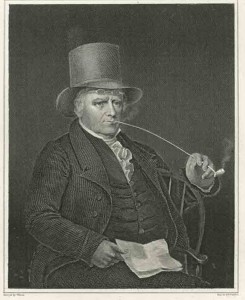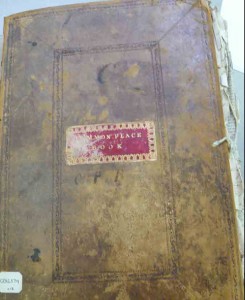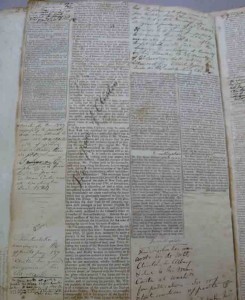 Eight years ago I came across my first commonplace book during my research on the post-Revolution New England Migration into New York State at the New York State Library. Between 1790 and 1810, an estimated nine thousand New Englanders traveled through Albany, New York; reportedly, five hundred Yankee-filled sleighs passed through the city every day in February 1795. I wanted to find information on how the migration affected Albany society. After days of looking I discovered the manuscripts of Elkanah Watson. In 1789, Watson relocated from his native Plymouth, Massachusetts to profit from Albany’s natural advantages and migration boom. Watson had strong opinions about Albany. He believed that the city had unlimited potential as an economic hub, as long as it could be improved and renovated to accommodate more people, roads, wharves, and factories. Watson left 70 boxes of papers to posterity, including 12 journals. Within his diaries, Watson recounted his journey between Providence, Rhode Island and Savannah, Georgia on behalf of John and Nicholas Brown in 1778. In 1779, Watson finished his apprenticeship with the Brown brothers and agreed to become their trading factor in France. Watson spent three years in Europe and kept a log of of his travels and experiences. However, I found Journal "C" to be the most curious chronicle within Watson's extensive journal collection.
Eight years ago I came across my first commonplace book during my research on the post-Revolution New England Migration into New York State at the New York State Library. Between 1790 and 1810, an estimated nine thousand New Englanders traveled through Albany, New York; reportedly, five hundred Yankee-filled sleighs passed through the city every day in February 1795. I wanted to find information on how the migration affected Albany society. After days of looking I discovered the manuscripts of Elkanah Watson. In 1789, Watson relocated from his native Plymouth, Massachusetts to profit from Albany’s natural advantages and migration boom. Watson had strong opinions about Albany. He believed that the city had unlimited potential as an economic hub, as long as it could be improved and renovated to accommodate more people, roads, wharves, and factories. Watson left 70 boxes of papers to posterity, including 12 journals. Within his diaries, Watson recounted his journey between Providence, Rhode Island and Savannah, Georgia on behalf of John and Nicholas Brown in 1778. In 1779, Watson finished his apprenticeship with the Brown brothers and agreed to become their trading factor in France. Watson spent three years in Europe and kept a log of of his travels and experiences. However, I found Journal "C" to be the most curious chronicle within Watson's extensive journal collection.
Journal "C" differed from Watson's other diaries in that "Commonplace Book" appeared stamped in gold letters on its cover. When I opened the book I found that he had pasted newspaper articles he agreed with, editorials he had authored, and marginalia on everything from street paving and drainage schemes for Albany to agricultural improvements and farming techniques. Watson claimed credit for many internal improvement schemes and posited himself as the father of the New York State Canal System and North American agricultural fairs. Watson kept his commonplace book to provide both evidence of his accomplishments and as a keepsake compendium of subjects that interested him. Intrigued by the idea of keeping a collection of assorted ideas, events, and information, I have decided to start my own commonplace book. In keeping with the times, I shall store my book on the world wide web.
As I study early American history, and given that the Internet did not exist in eighteenth- and nineteenth-century America, I have decided to call my miscellany an "uncommonplace book." Uncommonplace Book will be a blog about American history with an emphasis on the period between the French and Indian War (1754-1763) and the Age of Jackson (roughly 1824-1840). With that said, I intend to keep my commonplace book in the spirit that my early American subjects kept theirs: As a collection of writing, inquiry, and knowledge about my past, present, and future.
Welcome to Uncommonplacebook.com, a blog about American History.

